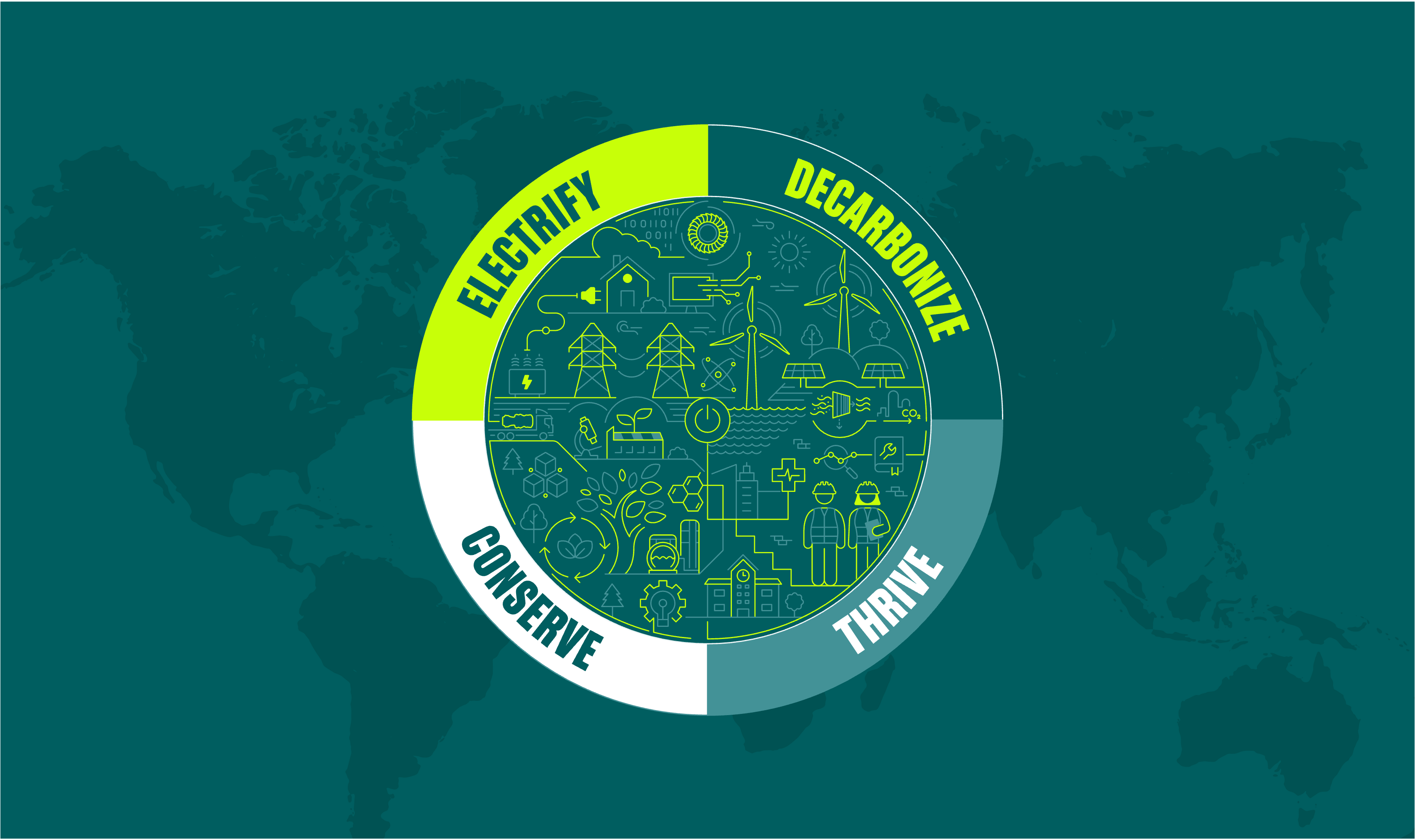Electrify and decarbonise: GE Vernova’s blueprint for a just energy transition
GE Vernova’s driving mission is to electrify and decarbonise the world. Our Sustainability framework, rooted in this purpose, is guided by four key pillars that support our vision for a just and sustainable energy future:
Electrify: Catalyse access to more secure, sustainable, reliable and affordable electricity, and help drive global economic development
Decarbonise: Invent, deploy and service the technology to decarbonise and electrify the world
Conserve: Innovate more while using less, safeguarding natural resources.
Thrive: Advance safe, responsible and equitable working conditions in our operations and across our value chain.
As a newly independent global leader in the power industry, GE Vernova’s technology base helps generate ~25% of the world’s electricity. Through a diverse portfolio of products and solutions, we aim to drive electrification to support large-scale decarbonisation by enhancing energy efficiency, renewable integration, and grid resiliency and reliability. We are committed to a just energy transition, focusing on effective and equitable solutions to provide access to lower carbon energy sources for people everywhere. Guided by ‘the energy trilemma’ – the challenge of achieving a more sustainable, reliable and affordable energy transition – GE Vernova is focused on building a sustainable future through strategic investments and collaborations, ensuring an inclusive decarbonisation that empowers communities to thrive and fosters economic growth.
GE Vernova’s role in the Mendoza Collective Action Summit in Argentina in early 2025 illustrates this. The event will seek to have selective participation from public interest, advocacy, public sector, academic and private sector stakeholders, with a focus on emerging economies. Coming out of this summit, we aim to unveil metrics, goals and actionable recommendations to consistently track progress and introduce a strategic plan to address the energy trilemma throughout 2025.
To advance a just transition, GE Vernova has developed a comprehensive method to assess progress in emission reduction, supporting our Conserve pillar. We have committed to achieving net zero in our Scope 1 and 2 emissions by 2030 through both absolute carbon emissions reductions, and the potential use of high-quality carbon offset and removal credits in the future. For Scope 3, we aim to reach net zero by 2050 for emissions from use of our sold products, supported by global collaboration, proactive policies and advanced technology. Meeting this target will require continued investment in breakthrough technologies, large-scale deployment across our sold products and infrastructure development.
Accelerating decarbonisation and achieving electrification goals require new power generation to lower carbon intensity, avoid carbon emissions and deploy adaptable technologies for future carbon reductions. These near-term targets aim to impact the climate trajectory and pave the way for achieving long-term goals. With that in mind, we intend to report on all our Scope 1, 2 and 3 emissions, with three core metrics guiding our Scope 3 efforts: carbon intensity, avoided carbon and carbon capability. This standardisation is intended to improve transparency and highlight collaboration opportunities to drive systemic change. We thus aim to enhance lower carbon energy access and foster a more sustainable future where people can thrive. Achieving deep decarbonisation in the coming decades will require scaling emerging technologies, investing in innovation and leveraging public-private partnerships to align policies
and infrastructure with technology advances.
Reinforcing this approach, GE Vernova is dedicated to modernising energy transmission infrastructure to integrate renewable energy sources and improve grid resilience. By advancing smart grids and AI-optimised networks, we aim to enhance reliability and support global electrification. Investments in energy storage, including advanced battery storage and hydro pumped storage, aim to provide stable energy supplies, particularly for vulnerable populations reliant on
variable resources. These efforts should foster social equity and resilience in addressing climate change, conserving resources and ensuring fair access to reliable energy throughout the energy transition to help these communities thrive.
Securing adequate capital is also crucial for a more sustainable transition. Innovative financing strategies, including co-development funding, public-private partnerships, government funding and technology incentives, are key for supporting energy infrastructure and lower-carbon projects. The €1 billion export finance cooperation agreement between GE Vernova’s Financial Services business and KUKE, Poland’s Export Credit Agency, illustrates how strategic collaborations can facilitate impactful investments. This agreement supports GE Vernova’s global energy customers in decarbonising and increasing electrification, while helping KUKE secure debt insurance on agreed transactions. It facilitates significant capital investment and enables renewable and gas power projects through Polish exports and supply chains.
A just energy transition ultimately entails building local capacities. Investing in knowledge and rewarding innovation support people manage emerging technologies and thrive in the evolving energy landscape. GE Vernova emphasises science, technology, engineering and mathematics (STEM) education and workforce development programmes, partnering with local communities, universities and institutions to cultivate a diverse and skilled workforce. This empowering strategy aims to ensure inclusive growth and active participation in the energy transition. The 3.6GW Dogger Bank Offshore Wind Farm in Northeast England highlights this approach, through the Dogger Bank Community Fund which aims to uplift local communities facing social and economic challenges. The fund is investing £1 million in STEM programmes for schools and has secured an additional £25 million from collaborators to enhance education and energy skills. The fund provides £1,000 grants to grassroots initiatives and has supported over 2,000 jobs in the UK.
GE Vernova is committed to a just energy transition, addressing the energy trilemma by modernising energy transmission and facilitating equitable access to energy. Through innovative financing, strategic partnerships and local capacity building, we mobilise resources for underserved areas and cultivate a diverse workforce. By setting benchmarks for decarbonisation, we plan to accelerate a systemic energy transition and focus on electrifying energy systems, decarbonising operations, conserving resources and ensuring that communities thrive. We aim to create a future where everyone can contribute and benefit from more sustainable solutions, fostering resilience and opportunities for all.












